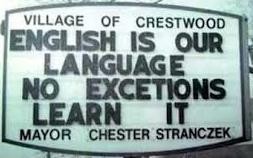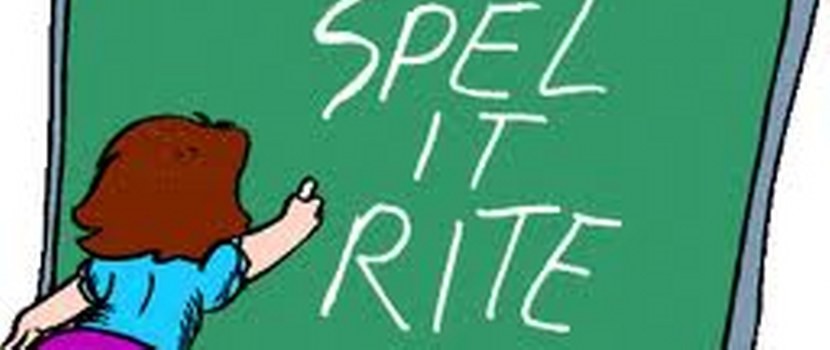by Magnus Shaw

Browsing through my emails this morning, discarding increasingly bizarre spam along the way, I was struck by a common element. Of the dozen or so genuine messages, over half contained basic spelling mistakes. I wasn't particularly surprised, it's not an unusual phenomenon, but I was irritated.
Then I paused and wondered whether it really mattered. After all, I understood the emails and was able to act on them.
Well, actually, it does matter and here's why: gsffterterf ndbhhdgtfclksrtt bdbgd bgd bdfdtsrtyu.That's not gobbledegook, it's a considered and robust argument. I just haven't bothered to spell it correctly.
Language, although an extraordinary thing, is far from exclusive to human beings - whales, dogs and birds all use forms of language. But the written word is peculiar to our species and has played an incalculable role in our progress. From the Declaration of Independence to Shakespeare's sonnets, Plato's "Republic" to Das Kapital - every time humankind takes a great leap forward, the ideas and propositions propelling us have been recorded in writing. For all its technological sophistication, Google's principal tool is written language. Interestingly, SEO campaigns include the incorrect spellings of keywords in order to capture searches made by those who can't spell.
An asset this precious and powerful should never been taken for granted (for centuries, the literate held the highest positions in society) and it is terrible folly to undermine its effectiveness. When words become less ordered, harder to fathom or undisciplined, their impact begins to diminish. The rules of language exist to ensure its overwhelming strength - play fast and loose with the rules and communication is compromised.
I completely accept the suggestion that words are in a state of constant flux. Language evolves to meet the needs of the people and societies it serves. Geoffrey Chaucer wrote in the English of the 14th century (known as Middle English), the same language we use today - and yet we find Middle English very difficult to understand, such are the changes and alterations it has undergone over 600 hundred years. However, we have learned that an established form of our language enables us to communicate with purpose and clarity. On its edges, we can accept new words and variations, but the core formation remains stable. Grammar is one indication of that stability, spelling is another.
Some assert that confusing "there" with "their" is inconsequential and in isolation, this may be true. But taken to their logical conclusion, misspelt words begin to lose their meaning and our capability for complex, written interaction is damaged.
So, why has poor spelling become widespread? I have spoken to a handful of teachers and, despite the myth, there was never a time in British schools when pupils were told spelling didn't matter. It has always been part of the curriculum. But there was an educational phase when incorrect spelling wasn't penalised in marking. I'm sure this hasn't helped. I can usually have a fairly accurate guess at the age or generation of a person from their writing, simply because those who left school after the late eighties are poorer spellers than those who preceded them. Surprisingly, a university education seems to make little difference. I have worked with graduates for years and their grasp of correct spelling and grammar is often particularly weak. But again this tends to depend on their age.
Above all, the most profound problem with bad spelling, is its capacity to reflect negatively on the writer. It may be because I write for a living, but I can't help forming the impression a person who cannot spell reliably is a bit stupid. Of course, in many cases, I am probably wrong. I know many people who are pretty bright, but can't really spell. Unfortunately, if I was only familiar with them through their writing (emails, notes, tweets), I would never know they were intelligent and would assume the opposite.
I'm happy to say, this isn't an incurable malaise. We can all improve our spelling. In the course of writing this column I had to check three words against a dictionary. So clearly, my spelling isn't infallible. But with a bit of luck, the next time I encounter those words, I won't need the dictionary. Improving our spelling ability takes a bit of effort, but not too much. And surely, when we consider the sheer glory of written words and how much they can achieve, it's well worth it.
Okay. Enough stuffy lecturing from a middle-aged copywriter. If I haven't convinced you, allow me to introduce an instance where bad spelling had slightly amusing consequences:

Magnus Shaw is a copywriter, blogger and consultant.
Visit Magnus Shaw's website
www.creativepool.co.uk/magnusshaw
"ADVICE" a collection of Magnus Shaw's colums is now available as a Kindle book.





